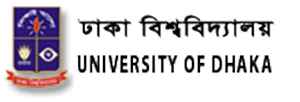Sustainable Development Goals

SDG 11: Sustainable Cities and Communities
SDG 11: Sustainable Cities and Communities
The University of Dhaka’s commitment to SDG 11: Sustainable Cities and Communities in 2023 reflects its dedication to creating an inclusive, sustainable, and culturally rich campus environment that serves not only students and staff but also the wider community. The university serves as a safe and open space for local residents, offering access to historical landmarks, cultural events, and educational resources. The University of Dhaka is pledged to preserve the art, culture, and heritage of the country along with sustainable development of the campus area. The university’s initiatives are categorized into Teaching, Research, Stewardship, and Community Engagement, providing a comprehensive view of its efforts.
Shaping Future Leaders
- Workshops and Lectures on Heritage Conservation: The Department of Sculpture, in collaboration with Nagar Upakhyan, conducted a terracotta workshop on the plaques of the Buddhist Vihara at Paharpur, focusing on their historical, architectural, and aesthetic significance. This initiative integrated knowledge of Bangladeshi heritage into education, promoting cultural preservation.
- Promoting Performing Arts:
- Classical Dance Performances: Faculty and students from the Department of Dance performed at notable events, including the Bangladesh Securities and Exchange Commission’s event and the Meril Prothom Alo Awards, showcasing traditional Bangladeshi dance to international audiences.
Innovative Solutions for Tomorrow
- Cultural Heritage Research: Projects like the interpretation of Paharpur terracotta plaques conducted under the World Heritage Volunteers (WHV) 2023 campaign highlight the university’s role in advancing knowledge about Bangladeshi art and architecture for global audiences.
- Zoology Museum Research Access: The Kazi Zaker Hossain Museum, housing one of the richest collections of animal specimens, and the department’s seminar library, offer free resources for both academic and community-based research in biodiversity and conservation.
Sustainable Campus and Practices
- Sustainable Transportation Initiatives: The introduction of five additional bus trips in 2023 enhances the university’s transportation network, promoting eco-friendly commuting while reducing traffic congestion and emissions in Dhaka.
- Libraries for All: Multiple libraries, including the Central Library, E-Library of Business Studies, and the English Department Library, remain open to students, staff, and the public, ensuring broad access to knowledge resources.
- Preserving cultural and natural heritage through museums and art exhibitions promotes sustainability while upholding historical significance.
Empowering Communities for Change
- Cultural Festivals and Exhibitions:
- The annual Mongol Shobhajatra, hosted by the Fine Arts Institute, welcomed thousands of participants to celebrate Bangla New Year, using motifs like sheep, elephants, and peacocks to symbolize peace and prosperity while advocating for the end of war.
- A six-day art exhibition at Zainul Gallery featured 65 sculptures and 23 drawings, showcasing student talent and promoting Bangladeshi art and culture.
- Green and Open Campus: The university provides public access to its green spaces, historical landmarks, and museums, fostering a safe and inclusive environment for learning and recreation.
- Flexible Work Options: The option for remote teaching and learning, introduced during COVID-19, remains in place, providing flexibility during natural disasters or political unrest while maintaining inclusivity.
Summary
The University of Dhaka’s initiatives for SDG 11 emphasize cultural heritage preservation, sustainable transportation, inclusive public access, and environmentally conscious campus management. Through a blend of education, research, stewardship, and vibrant community events, the university continues to foster an inclusive, resilient, and sustainable community, aligning with the global goals of SDG 11.

